Communication Skills with Spouse: Building a Stronger Marriage
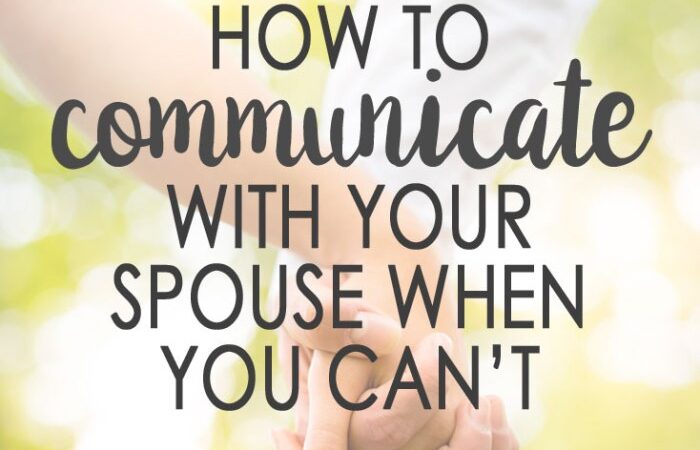
Communication skills with a spouse are the foundation of a strong and lasting marriage. Effective communication allows couples to understand each other’s needs, resolve conflicts, and build emotional intimacy. When communication breaks down, it can lead to misunderstandings, resentment, and even conflict.
This guide explores key communication skills that can help couples navigate the challenges of marriage and foster a deeper connection.
We will delve into active listening, expressing needs and feelings, conflict resolution, building emotional intimacy, and the importance of nonverbal communication. We’ll also discuss managing expectations and the benefits of seeking professional help when needed. By mastering these skills, couples can create a more fulfilling and loving partnership.
Understanding the Importance of Communication in Marriage
Communication is the lifeblood of any relationship, and this is especially true for marriage. Effective communication allows partners to build a strong foundation of trust, intimacy, and understanding, fostering a healthy and fulfilling relationship.
The Role of Effective Communication in a Healthy Marriage
Effective communication in marriage involves being able to express thoughts, feelings, and needs clearly and respectfully. It also entails active listening, understanding the partner’s perspective, and finding common ground. This creates a safe and supportive environment where both partners feel heard, valued, and respected.
The Potential Consequences of Poor Communication in a Marriage
Poor communication can have a detrimental impact on a marriage, leading to misunderstandings, resentment, and conflict. When partners fail to communicate effectively, they may struggle to resolve disagreements, leading to unresolved issues that can fester and damage the relationship.
Examples of Communication Breakdowns Leading to Conflict and Misunderstandings
- Unclear Expectations: When partners have different expectations about roles, responsibilities, or communication styles, it can lead to misunderstandings and conflict. For example, one partner may expect frequent communication while the other prefers more space, leading to frustration and resentment.
- Lack of Active Listening: Failing to listen attentively and genuinely understand the partner’s perspective can lead to misinterpretations and miscommunications. For example, one partner may be expressing their concerns, while the other is not truly listening, leading to feelings of being unheard and unimportant.
- Defensive Communication: Responding defensively to criticism or feedback can escalate conflicts and prevent constructive dialogue. For example, instead of listening to their partner’s concerns, one partner may become defensive and dismiss their points, hindering any potential for resolution.
- Avoidance: Avoiding difficult conversations or suppressing emotions can lead to bottled-up resentment and tension. For example, one partner may avoid discussing a sensitive issue, hoping it will go away, but this can lead to further resentment and damage the relationship.
Active Listening Skills
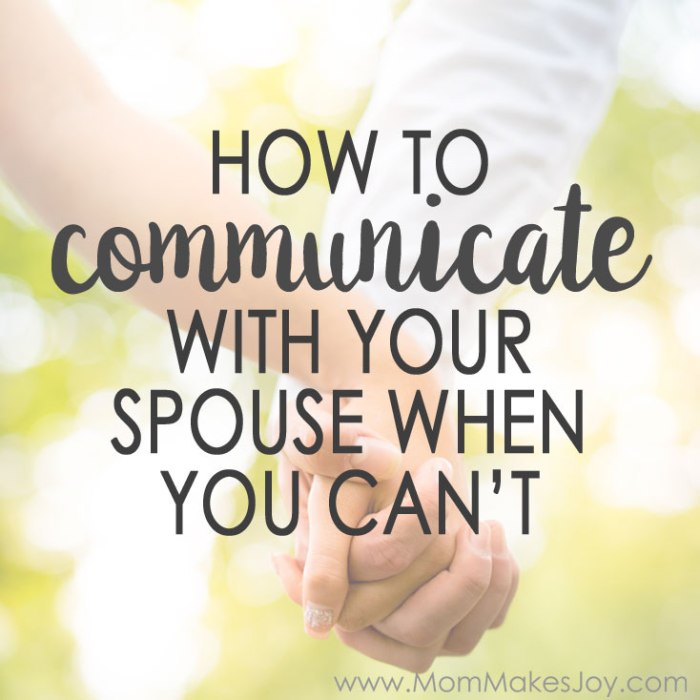
Active listening is a fundamental skill in any relationship, but it’s especially crucial in marriage. When couples actively listen to each other, they create a space for understanding, empathy, and connection. It allows them to navigate challenges, resolve conflicts, and strengthen their bond.
The Importance of Active Listening in Marital Communication
Active listening goes beyond simply hearing the words your spouse is saying. It involves paying full attention, understanding their perspective, and showing that you care about what they have to say. It’s about being present in the moment and engaging with your spouse on an emotional level.
Active Listening Techniques
Active listening techniques can help you become a better listener and enhance communication in your marriage. Here are some examples:
- Paraphrasing: Restate what your spouse has said in your own words to ensure you understand their message correctly. This demonstrates that you are paying attention and trying to grasp their meaning.
- Asking Clarifying Questions: If something is unclear, don’t hesitate to ask questions to gain a deeper understanding. This shows that you are interested in what they have to say and want to ensure you’re on the same page.
- Maintaining Eye Contact: Eye contact conveys that you are engaged and present in the conversation. It helps create a connection and shows your spouse that you are paying attention.
- Nonverbal Cues: Your body language can also communicate your level of engagement. Nodding your head, leaning in, and maintaining an open posture shows that you are listening and interested.
- Avoiding Interruptions: Allow your spouse to finish their thoughts before you respond. Interrupting can make them feel unheard and disrespected.
- Putting Aside Distractions: Minimize distractions like phones, television, or other tasks to focus entirely on the conversation.
How Active Listening Helps Couples Understand Each Other Better
Active listening fosters empathy and understanding by encouraging couples to see things from each other’s perspectives. When you actively listen to your spouse, you’re not just hearing their words, but also their emotions and underlying needs. This can help you gain a deeper understanding of their feelings and motivations, even when you don’t agree with them.
“Active listening is a powerful tool for building trust and intimacy in a marriage. It allows couples to connect on a deeper level and create a safe space for vulnerability and communication.”
Expressing Needs and Feelings
A healthy marriage thrives on open and honest communication, especially when it comes to expressing needs and feelings. Being able to articulate your needs and emotions clearly and assertively is crucial for building a strong and fulfilling partnership. It allows your spouse to understand your perspective, empathize with your experiences, and work together to find solutions that benefit both of you.
Communicating Needs and Feelings Effectively
It’s essential to communicate your needs and feelings in a way that is constructive and avoids blame or accusations. Instead of focusing on what your spouse is doing wrong, try to express your needs and feelings from your perspective.
Here are some effective ways to do so:
- Use “I” statements: Instead of saying “You never listen to me,” try “I feel unheard when I try to talk about my day.” “I” statements focus on your feelings and experiences, which can be less confrontational and more likely to be heard by your partner.
- Be specific: Instead of saying “You’re always so selfish,” try “I felt hurt when you didn’t ask me about my day at work.” Specific examples make it easier for your partner to understand your perspective and respond appropriately.
- Focus on the present: Avoid bringing up past grievances or making generalizations. Instead, focus on the current situation and how it is affecting you.
- Choose the right time and place: When you need to discuss something important, make sure it’s a time when you can both be fully present and attentive. Avoid bringing up sensitive topics when you’re tired, stressed, or distracted.
Creating a Safe and Supportive Environment
For couples to feel comfortable expressing their vulnerabilities, it’s crucial to create a safe and supportive environment where they can feel heard and understood. This involves actively listening to each other, validating each other’s feelings, and showing empathy.
- Show empathy: Try to understand your partner’s perspective, even if you don’t agree with it. Acknowledge their feelings and let them know that you care about how they feel.
- Avoid defensiveness: When your partner expresses their needs or feelings, resist the urge to become defensive or to argue back. Instead, try to listen and understand their point of view.
- Be patient: It takes time to learn how to communicate effectively. Be patient with yourself and your partner as you both work on improving your communication skills.
- Seek professional help: If you’re struggling to communicate effectively with your spouse, don’t hesitate to seek professional help from a couples therapist. They can provide you with tools and strategies to improve your communication skills and strengthen your relationship.
Conflict Resolution
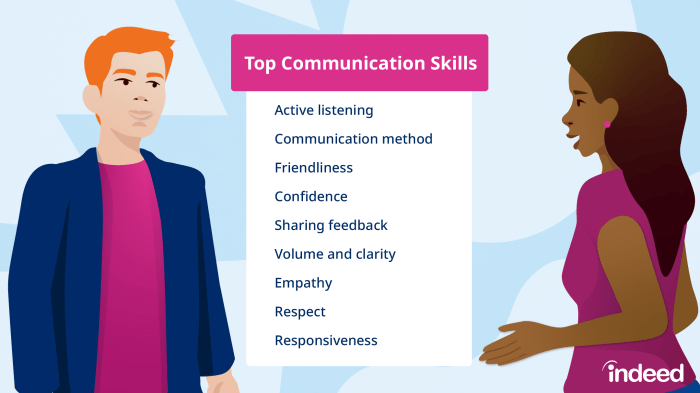
Conflict is an inevitable part of any relationship, and marriage is no exception. Disagreements can arise over a wide range of issues, from household chores and finances to parenting styles and personal values. While conflict can be stressful, it can also be an opportunity for growth and understanding.
Learning to resolve conflicts constructively is essential for a happy and healthy marriage.
Approaches to Conflict Resolution
Different couples may find different approaches to conflict resolution more effective. Some common approaches include:
- Compromise: This involves finding a solution that meets the needs of both partners to some degree, even if it’s not a perfect solution for either one. For example, if one partner wants to go out to dinner and the other wants to stay home and watch a movie, they might compromise by going out for a casual dinner and then coming home to watch a movie.
- Collaboration: This approach involves working together to find a solution that meets the needs of both partners as much as possible. This may require brainstorming, active listening, and a willingness to be flexible. For example, if a couple is arguing about how to spend their vacation, they could collaborate by creating a list of potential activities that appeal to both of them and then choosing one or two that they can both enjoy.
- Negotiation: This approach involves discussing the issues at hand and trying to reach an agreement that is acceptable to both partners. This may involve making concessions or trading off different priorities. For example, if a couple is arguing about how to spend their money, they might negotiate a budget that allocates a certain amount for each partner’s spending and a certain amount for shared expenses.
- Avoidance: This approach involves trying to avoid conflict altogether. While this may seem like an easy solution in the short term, it can lead to resentment and bottled-up emotions that can eventually erupt into a much bigger argument. It’s important to address conflicts rather than sweep them under the rug.
Importance of Finding Mutually Acceptable Solutions
Finding mutually acceptable solutions is crucial for several reasons:
- Preserve the Relationship: When both partners feel heard and understood, it strengthens the bond between them. This is especially important in the face of conflict, as it can help to prevent resentment and bitterness from building up.
- Promotes Respect: When partners work together to find solutions that work for both of them, it shows that they respect each other’s opinions and needs. This fosters a sense of partnership and equality in the relationship.
- Encourages Collaboration: Finding mutually acceptable solutions requires both partners to be willing to compromise and work together. This can help to build a sense of teamwork and cooperation in the relationship.
Effective Communication Strategies
Effective communication is essential for resolving conflicts constructively. Here are some strategies to keep in mind:
- Choose the Right Time and Place: It’s important to find a time and place where both partners feel comfortable and safe to talk openly and honestly. Avoid bringing up sensitive topics when either partner is stressed, tired, or distracted.
- Focus on “I” Statements: Using “I” statements helps to express your feelings and needs without blaming or accusing your partner. For example, instead of saying “You always leave your clothes on the floor,” try saying “I feel frustrated when I see clothes on the floor because it makes the house look messy.”
- Active Listening: Active listening involves paying attention to what your partner is saying, both verbally and nonverbally. It means trying to understand their perspective, even if you don’t agree with it. You can show that you are listening by making eye contact, nodding your head, and asking clarifying questions.
- Take Breaks: If the conversation becomes heated, it’s okay to take a break and come back to it later when you’ve both had a chance to calm down. This can help to prevent the conversation from escalating into an argument.
Building Emotional Intimacy

Emotional intimacy is the feeling of being deeply connected to your spouse on a personal level. It goes beyond physical attraction and encompasses a shared sense of understanding, trust, and vulnerability. Communication plays a vital role in cultivating and nurturing this intimacy.
The Role of Communication in Building Emotional Intimacy
Open and honest communication is the cornerstone of building emotional intimacy in a marriage. It allows couples to share their thoughts, feelings, hopes, and dreams, creating a safe space for vulnerability and understanding.
Examples of Ways to Connect Emotionally with a Spouse Through Communication
Here are some examples of ways to connect emotionally with your spouse through communication:
- Share your day: Even if it seems mundane, sharing the details of your day can help your spouse feel connected to your life and experiences.
- Express appreciation: Regularly expressing appreciation for your spouse’s actions, qualities, or contributions can strengthen the bond between you.
- Engage in meaningful conversations: Discussing topics that are important to both of you, whether it’s personal goals, shared values, or current events, can foster deeper understanding and connection.
- Practice active listening: Truly listening to your spouse’s perspective, without interrupting or offering unsolicited advice, demonstrates care and respect.
- Share your feelings: Being open and honest about your emotions, both positive and negative, allows your spouse to understand you better and connect with you on a deeper level.
How Open and Honest Communication Can Foster a Deeper Sense of Love and Understanding
Open and honest communication can foster a deeper sense of love and understanding by:
- Creating a safe space for vulnerability: When couples feel safe to share their true selves, it allows for deeper emotional connection and intimacy.
- Building trust and confidence: Open communication fosters trust by demonstrating that you are willing to be honest and transparent with your spouse.
- Resolving conflicts effectively: Open communication allows couples to address issues and disagreements constructively, preventing resentment and fostering understanding.
- Strengthening the bond: Sharing your thoughts, feelings, and experiences creates a sense of shared history and deepens the bond between you and your spouse.
Nonverbal Communication
In the realm of marriage, communication transcends mere words. Nonverbal cues play a pivotal role in conveying emotions, intentions, and understanding, shaping the fabric of a relationship.
Understanding Nonverbal Communication
Nonverbal communication encompasses a spectrum of cues, including body language, tone of voice, and facial expressions. These cues can amplify or contradict verbal messages, adding layers of meaning to interactions.
Body Language
Body language provides insights into a person’s emotional state and intentions. For instance, crossed arms might signal defensiveness, while an open posture with relaxed shoulders can convey openness and receptiveness.
Tone of Voice
The tone of voice can drastically alter the meaning of words. A gentle tone can convey affection, while a harsh tone might indicate anger or frustration.
Facial Expressions
Facial expressions are powerful indicators of emotions. A smile can express happiness, while a frown can signal sadness or disapproval.
Examples of Nonverbal Cues in Marriage
- A gentle touch on the arm during a conversation can convey affection and support.
- Rolling one’s eyes during a discussion can communicate disrespect and disinterest.
- A warm embrace after a disagreement can signal forgiveness and reconciliation.
- A lack of eye contact during a conversation can suggest disengagement or discomfort.
Managing Expectations: Communication Skills With Spouse
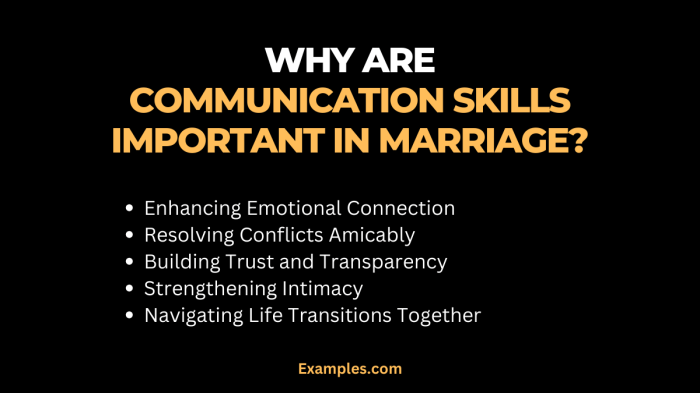
Every relationship thrives on a foundation of shared understanding and mutual respect. Within marriage, managing expectations plays a crucial role in fostering a healthy and fulfilling partnership. When couples have realistic expectations of each other and the relationship itself, they are better equipped to navigate challenges, resolve conflicts, and nurture a sense of contentment.
Communication and Expectation Management
Open and honest communication is paramount in managing expectations. By engaging in meaningful conversations about their individual needs, values, and aspirations, couples can gain a deeper understanding of each other’s perspectives and expectations. This shared understanding helps prevent misunderstandings and disappointments, fostering a more harmonious and fulfilling partnership.
- Active Listening: Active listening involves paying full attention to your partner’s words, both verbal and nonverbal, and demonstrating genuine interest in their perspective. By actively listening, you can gain a clearer understanding of their expectations and address any concerns they may have.
- Expressing Needs and Feelings: Communicating your own needs and feelings, using “I” statements to express your perspective, helps your partner understand your expectations and encourages open dialogue.
- Negotiating Expectations: It is important to remember that marriage is a partnership, and compromise is key. Couples should be willing to negotiate and adjust their expectations to find common ground and create a balance that works for both partners.
Tips for Discussing and Negotiating Expectations
- Choose the Right Time and Place: Select a time when you are both relaxed, free from distractions, and able to engage in a calm and constructive conversation.
- Focus on “We” Statements: Use phrases like “we can” or “we want” to emphasize that you are working together to achieve shared goals. This fosters a sense of unity and collaboration.
- Avoid Accusations: Frame your concerns in a non-judgmental way, focusing on your feelings and needs rather than blaming your partner.
- Be Willing to Compromise: Recognize that you may need to adjust your expectations to find a solution that works for both of you.
- Seek Professional Help: If you are struggling to communicate effectively or manage expectations, consider seeking guidance from a therapist or counselor. They can provide tools and strategies to enhance your communication skills and foster a healthier relationship.
Seeking Professional Help

Sometimes, despite our best efforts, communication challenges in a marriage can feel overwhelming. In such instances, seeking professional help can be a valuable step towards strengthening your relationship. A therapist specializing in couples counseling can provide a safe and neutral space to address communication issues, offering valuable insights and tools for positive change.
Benefits of Couples Therapy
Couples therapy offers a structured environment for couples to work through communication difficulties and develop healthier patterns of interaction.
- Objective Perspective: A therapist provides an objective perspective on the communication dynamics within the relationship, helping couples identify patterns and blind spots they may not have noticed on their own.
- Communication Skills Development: Therapists equip couples with specific communication skills, such as active listening, assertive expression of needs, and conflict resolution techniques, empowering them to navigate disagreements more effectively.
- Emotional Understanding: Therapy facilitates deeper emotional understanding between partners, allowing them to connect on a more profound level and build greater empathy for each other’s experiences.
- Improved Conflict Resolution: Couples therapy provides a framework for resolving conflicts constructively, fostering healthy communication, and reducing the likelihood of destructive patterns.
- Increased Intimacy: By addressing communication barriers, couples therapy can create a foundation for greater intimacy and connection, fostering a more fulfilling and loving relationship.
Situations Where Seeking Professional Help May Be Beneficial, Communication skills with spouse
There are several situations where seeking professional help can be particularly beneficial for couples struggling with communication:
- Recurring Arguments: If you find yourselves constantly arguing about the same issues, despite attempts to resolve them, seeking professional guidance can help you break the cycle and find more constructive solutions.
- Lack of Communication: If you’ve drifted apart and find it difficult to connect on an emotional level, couples therapy can provide tools to rekindle communication and rebuild intimacy.
- Major Life Transitions: Significant life events, such as the birth of a child, career changes, or the loss of a loved one, can strain communication and relationships. A therapist can help couples navigate these challenges and adapt to new realities.
- Infidelity or Betrayal: When trust has been broken, couples therapy can provide a safe space to address the pain and work towards rebuilding trust and intimacy.
- Emotional Distance: If you feel emotionally disconnected from your partner, therapy can help you understand the underlying reasons and develop strategies for reconnecting.
Conclusive Thoughts
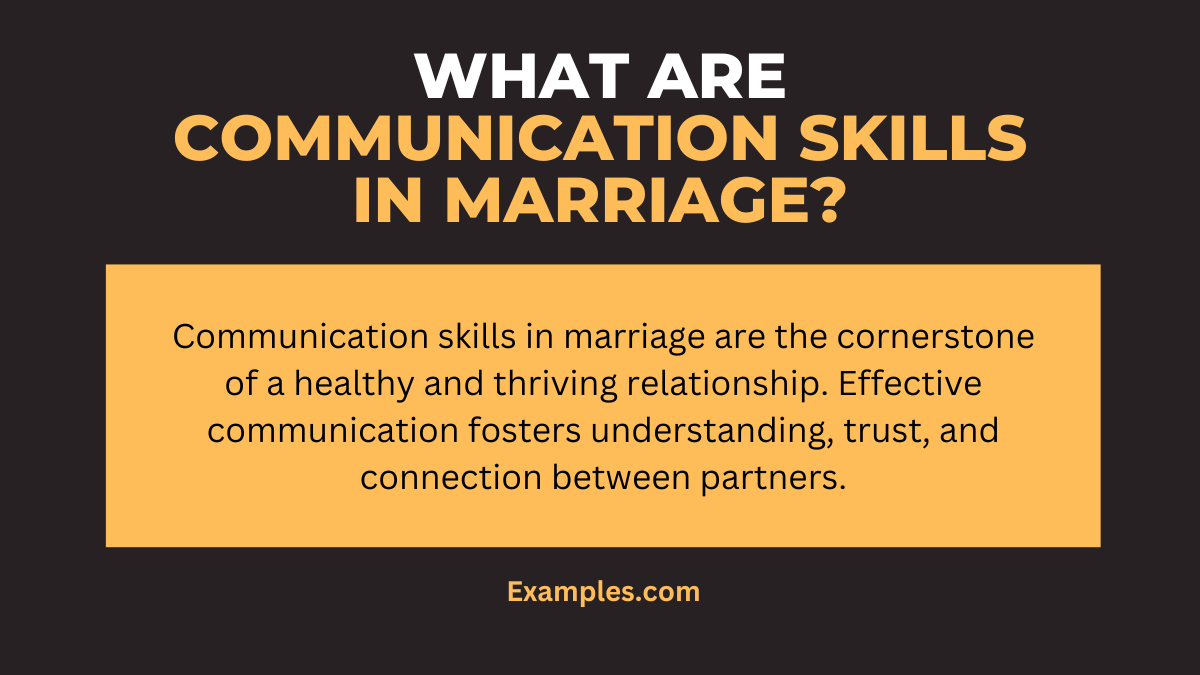
Strong communication is the cornerstone of a happy and healthy marriage. By investing time and effort in developing effective communication skills, couples can strengthen their bond, resolve conflicts constructively, and build a deeper level of intimacy. Remember, communication is a continuous journey, and it’s important to be patient and understanding with each other.
Through open and honest communication, couples can navigate the challenges of marriage and create a fulfilling and lasting partnership.
Comments are closed.